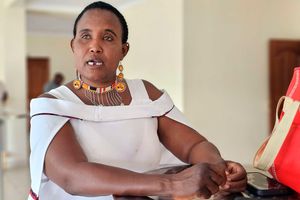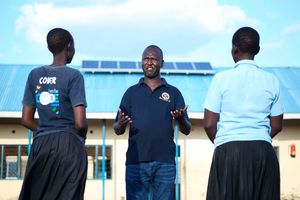Climate change widens gap between men and women's income by Sh689 bn annually

The PSPs in Kenya include telcos such as Safaricom, Airtel, and Telkom Kenya.
What you need to know:
- Climate inequality is not new; climate change leads to extreme heat, flooding, and droughts.
- These weather extremes are now the primary drivers of hunger in 18 countries, where 72 million people face acute climate-related challenges.
As prolonged dry spells ravage the rural landscape of Melili, Narok County, Kenya, Esther Supuko's life has taken a challenging turn. Once reliant on her husband to manage their livestock, Esther now finds herself herding calves and weakened animals while he ventures further afield in search of scarce grazing land.
With her husband and other clansmen often away, the responsibility of maintaining their household falls squarely on her shoulders.
The relentless drought further compounds their struggles, with Esther trekking more than two kilometres to a community well for water, a gruelling journey that underscores the increasing climate-induced burden on women.
Her experience reflects a broader trend identified in a recent report by Care International, which reveals that climate change is a critical driver of economic inequality, contributing to an annual income gap of 53 billion US dollars between men and women.
Climate inequality is not new; climate change leads to extreme heat, flooding, and droughts. These weather extremes are now the primary drivers of hunger in 18 countries, where 72 million people face acute climate-related challenges.
The report reveals that climate-related crises widen the income gap between the poorest populations by 21 billion US dollars annually. In 2024, 95 countries are projected to have GDPs lower than 50 billion US dollars, highlighting the vulnerability of nations most affected by climate change.
The report further shows that women face significant challenges due to climate change, working 55 minutes more per week than men as they manage the additional burdens of securing food, water, and resources during extreme weather events.
This increased workload impacts their income potential and adds to their unpaid care responsibilities, further entrenching existing inequalities.
Moreover, women are more likely than men to experience food insecurity, with 4 out of 5 crises reported by women in 2023 being climate-related. These crises include food shortages, lack of clean water, conflict, drought, and pest infestations, all intricately linked to climate change.
Extreme weather events disrupt agricultural productivity and access to essential resources, exacerbating the struggles faced by women and their families.
Research indicates that heightened worry about extreme weather correlates with lower food security; women are particularly affected by this anxiety. They report being more concerned about severe weather events causing harm, which can further impact their mental well-being and ability to secure food for their families.
Despite the clear need for gender-sensitive approaches in climate action, women's representation in leadership roles remains alarmingly low. At COP28, only 15 out of 133 leaders were women, reflecting a broader trend of underrepresentation across various sectors.
This lack of female leadership, the report shows, translates into policies that often overlook women's needs and perspectives, further hindering their ability to adapt to climate challenges.
Additionally, women face systemic barriers to accessing crucial resources such as finance and technology. Nearly 1 billion women lack access to financial services, making it difficult to recover from crises and invest in adaptive measures.
They also have less access to agricultural support and climate information than men, limiting their ability to respond effectively to climate shocks.
Breaking The Barriers echoes the Food and Agriculture Organization's (FAO) report, The Unjust Climate, highlighting that female-headed households lose substantially more income than their male counterparts when extreme weather strikes. Specifically, a day of extreme temperature translates into an annual income gap of 11 per cent due to heat stress and flooding.
FAO reports that female-headed households adopt diverse strategies to cope with extreme weather events in response to these challenges. For example, during floods, they may intensify agricultural activities by acquiring more livestock and investing more in their farming systems.
Conversely, droughts and heat stress reduce these women's livestock holdings and agricultural expenditures, indicating that their adaptive strategies do not effectively enhance resilience against climate impacts.
All is not lost, Care International observes. Women across the globe, particularly in low-income areas, are learning innovative ways to adapt to the challenges posed by climate change. They are embracing new agricultural practices, such as growing food differently by diversifying crops and utilizing sustainable farming techniques that enhance resilience against extreme weather.
These women improve their yields by reinvigorating soils through crop rotation and organic fertilization for long-term soil health.
More women are actively planning for crises and helping their communities prepare by forming community networks to share knowledge and resources on climate action. This communal approach fosters solidarity and resilience, enabling them to withstand shocks such as droughts or floods better.
Additionally, they invest in initiatives like planting trees to combat climate change while providing essential resources such as fruits and firewood.




